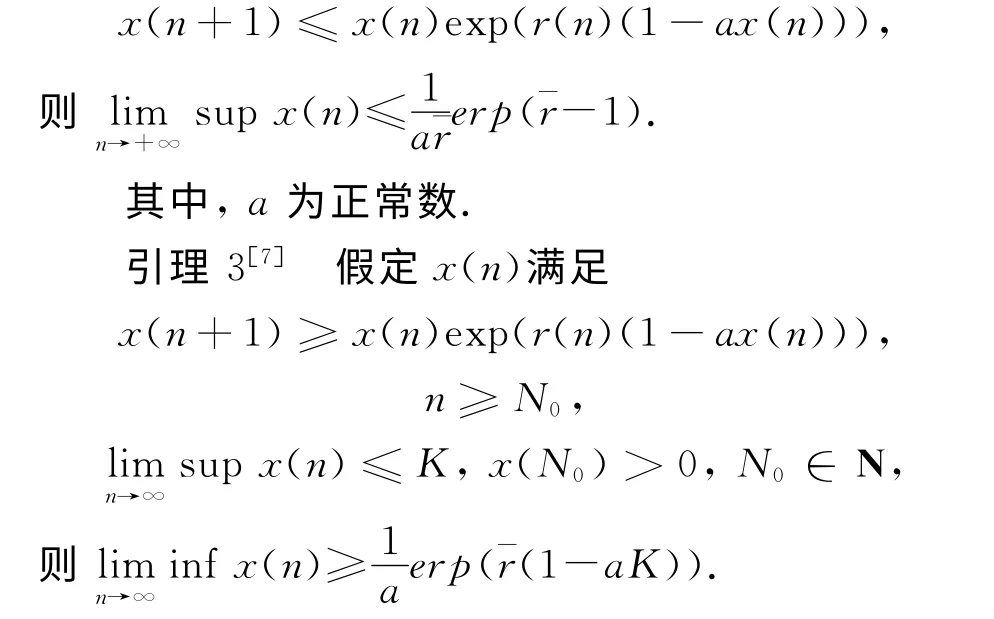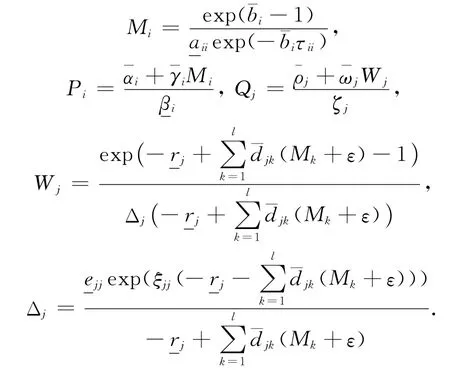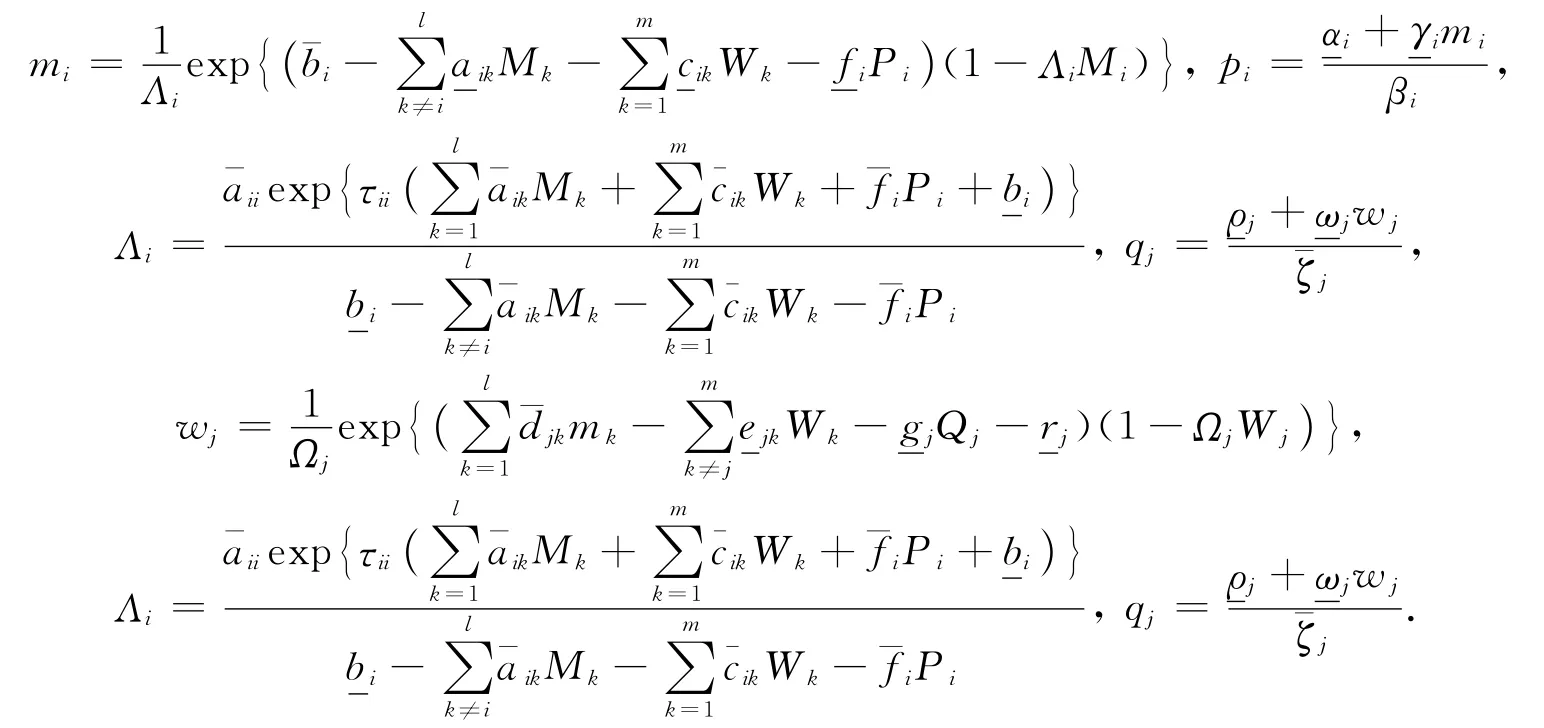具有反馈控制的多种群捕食-竞争系统的持久性
王丽丽,程永玲
(山西大学商务学院 理学系,山西 太原030031)
Lotka-Volterra系统在生物数学中起着重要作用.近几年,很多学者对该系统的概周期解,持久性和全局稳定性进行了广泛的研究[1-16].在文献[1]中,Zhou Z,和Zou X研究了离散周期逻辑方程(1)的持久性和周期稳定解的存在性.

文献[2]利用泛函理论研究了具有时滞的概周期Lotka-Volterra竞争系统正概周期解的唯一性.文献[3]研究了具有时滞的多种群捕食和竞争系统的持久性.最近,具有反馈控制的Lotka-Volterra系统得到了极大关注[4-6].文献[4]提出了具有反馈控制的单种群离散模型(2),研究了模型的持久性.

文献[5]研究了具有时滞和反馈控制的非自治单种群离散系统的持久性,在所得到的结论中,发现反馈控制对持久性是无害的.
本文考虑系统

系统(3)具有初始条件



令

为方便,先介绍与本文相关的记号和定义.对任意的有界函数x(n),记

定义1 若存在正常数Mi,mi(i=1,2,3,4)使得对系统(3)的任意正解

都有

则称系统(3)是持久的.
考虑差分方程

式中:A,B为正常数.
引理1[4]假定|A|<1,且对任意的初始值y(0),存在方程(4)的唯一解y(k),表示为

引理2[7]假定x(n)满足x(n)>0,且当n∈[n1,∞)时,

其中,a为使得a K>1的常数.
定理1 假定H1~H3成立,则对系统(3)的任意正解,存在正常数Mi,Pi,Wj,Qj使得

其中

证明 根据系统(3)的第1个方程,有

进而

即

因此



用类似的方法,可以证明

于是

由引理2,有lni→m∞yj(n)≤Wj.由系统(3)的第3个方程,有

由引理1以及差分方程比较定理,可得

定理2 假定H1~H3成立,且

则对系统(3)的任意正解,存在正常数mi,pi,wj,qj,使得

其中

证明 由定理1,对任意的ε>0,存在常数n1∈N,使得当n>n1时,有

ui(n)≤Pi+ε,vj(n)≤Qj+ε,因此,对系统(3)的第1个方程,有

于是当n≥τii时,有

所以

进一步,可以得到


用类似的方法,可以得到

于是,由引理3,有lni→m∞inf yj(n)≥wj.
对充分小的ε>0,由系统(3)的第3个方程,有

由引理1以及差分方程的比较原理,可得

在式(6)中令ε→0,可得

同理,对系统(3)的第4个方程,可得

证毕.
根据定理1和定理2的结论,可知系统(3)是持久的.
[1]Zhou Z,Zou X.Stable periodic solutions in a discrete periodic logistic equation[J].Appl.Math.Lett.,2003,16(2):165-171.
[2]Li Z,Chen F D,He M X.Almost periodic solutions of a discrete Lotka-Volterra competi tion system with dealys[J].Nonlinear Anal.RWA,2011,12(4):2344-2355.
[3]Liao X Y,Zhou S F,Raffoul Y N.On the discretetime multi-species competition-preda tionsystem with several delays[J].Appl.Math.Lett.,2008,21(1):15-22.
[4]Chen F D.Permanence of a single discrete model with feedback control and delay[J].Appl.Math.Lett.,2007,20(7):729-733.
[5]Xu J B,Teng Z D.Permanence for nonautonomous discrete single-species system with delays and feedback control[J].Appl.Math.Lett.,2010,23(9):949-954.
[6]Chen F D.Permanence in nonautonomous multi-species predator-prey system with feed back controls[J].Appl.Math.Comput.,2006,173(2):694-709.
[7]Yang X.Uniform persistence and periodic solutions for a discrete predator-prey system with dealys[J].J.Math.Anal.Appl.,2006,316(1):161-177.
[8]Chen F D.Permanence and global attractivity of a discrete multispecies Lotka-Volterra competition predator-prey systems[J].Appl.Math.Comput.,2006,182(1):3-12.
[9]Liao X Y,Zhou S F,Chen Y M.Permanence for a discrete time Lotka-Volterra type food-chain model with delays[J].Appl.Math.Comput.,2007,186(1):279-285.
[10]Chen L S,Lu Z,Wang W D.The effect of delays on the permanence for Lotka-Volterra systems[J].Appl.Math.Lett.,1995,8(4):71-73.
[11]Muroya Y.Persistence and global stability for discrete models of nonautonomous Lotka-Volterra type[J].J.Math.Anal.Appl.,2002,273(2):492-511.
[12]Muroya Y.Persistence and global stability in discrete models of pure-delay nonautonomous Lotka-Volterra type[J].J.Math.Anal.Appl.,2004,293(2):446-461.
[13]Li Y K.Positive periodic solutions of discrete Lotka-Volterra competition systems with state dependent and distributed delays[J].Appl.Math.Comput.,2007,190(1):526-531.
[14]Zeng X Y,Shi B,Gai M J.A discrete periodic Lotka-Volterra system with delays[J].Comput.Math.Appl.,2004,47(4):491-500.
[15]Fang N,Chen X X.Permanence of a discrete multispecies Lotka-Volterra competition predator-prey system with delays[J].Nonlinear Anal.RWA,2008,9(5):2185-2195.
[16]Muroya Y.Persistence and global stability in discrete models of Lotka-Volterra type[J].J.Math.Anal.Appl.,2007,330(1):24-33.

